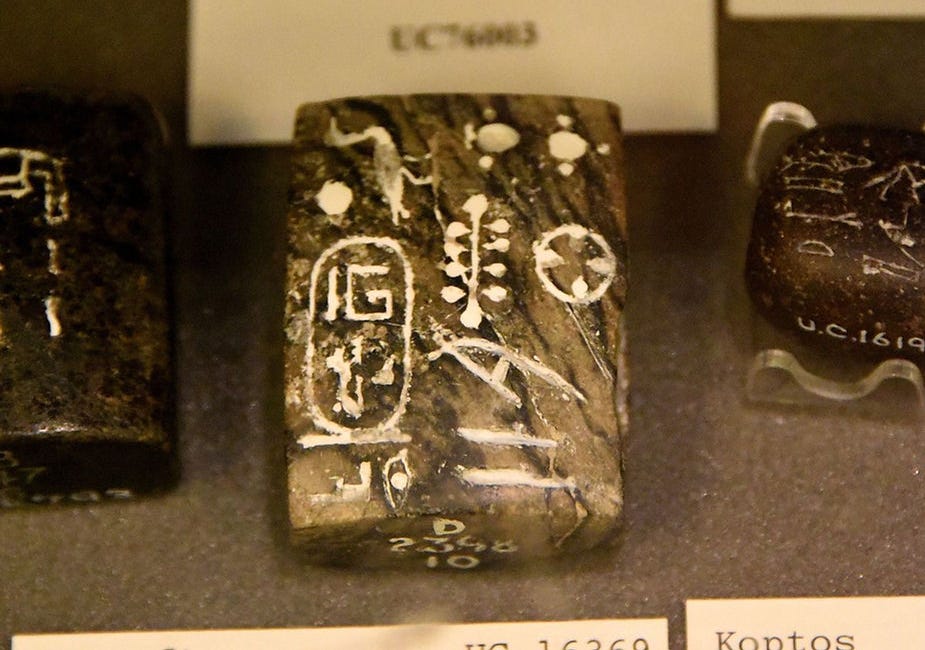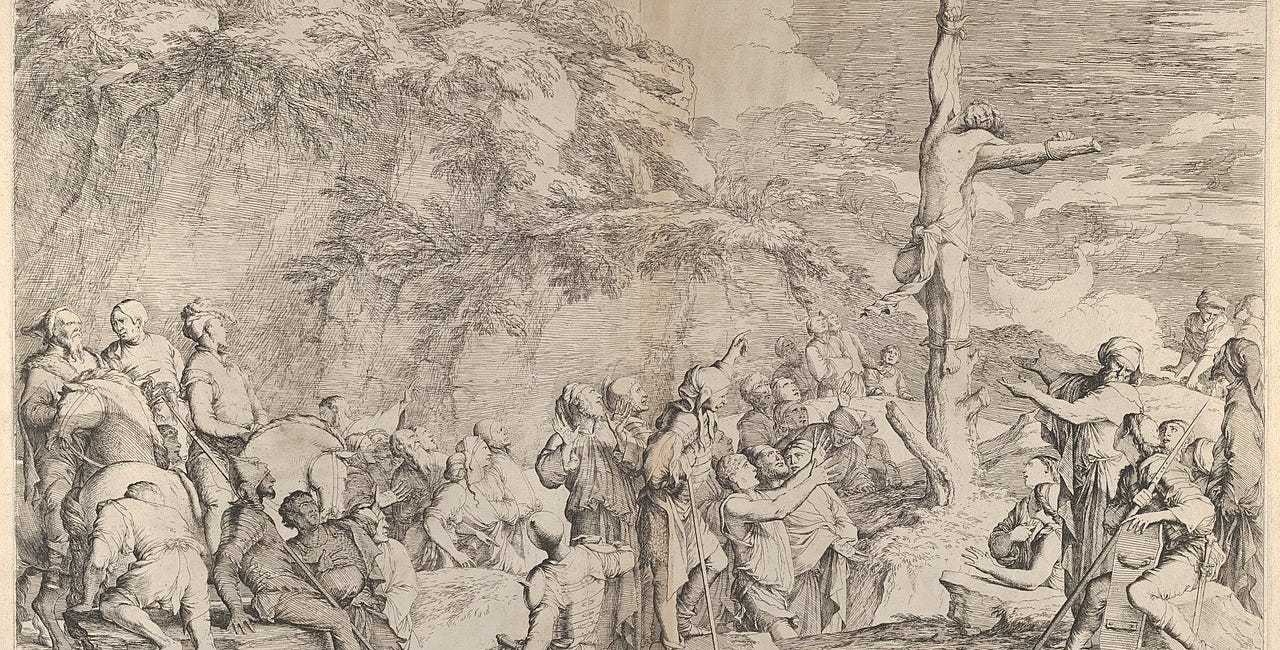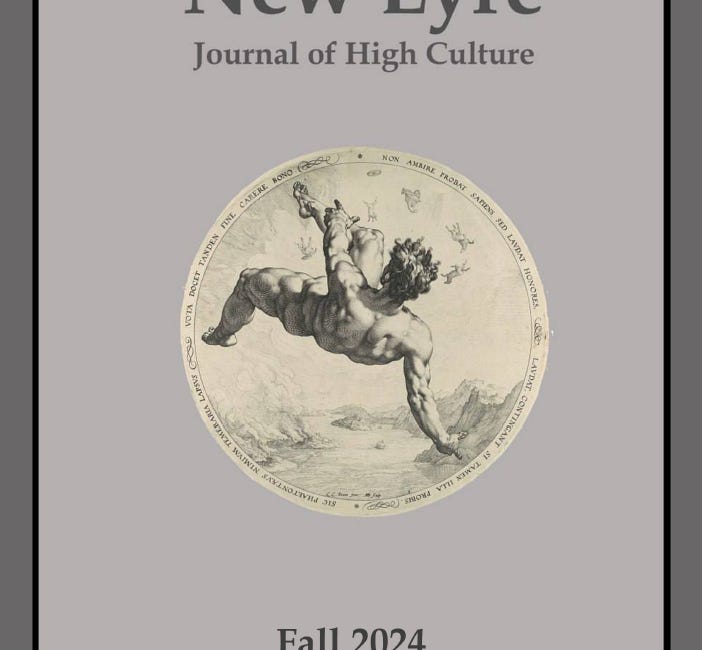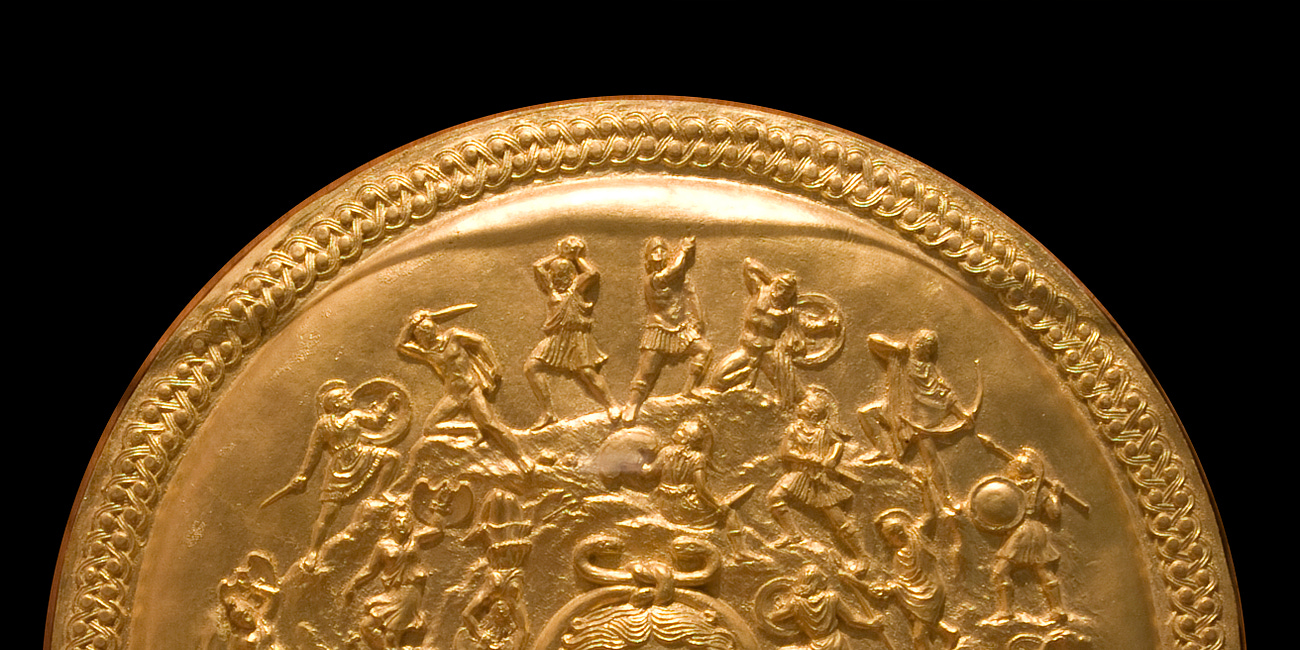In Friedrich Schiller’s poem “The Cranes of Ibykus,” when the poet Ibykus is murdered in a forest by a troop of thugs, he thinks himself alone. There appears to be no avenging justice or potential witness to right the historical wrong or reveal what truly happened on that day. By the time the poet is discovered disfigured in a forest, his murderers have long since fled.
While the Western world appears to be descending into an abyss, its history littered with assassinations and the corpses of dead leaders, including John F. Kennedy and Bobby Kennedy, Martin Luther King and countless others who stood up to the Western Leviathan and its security state, we should remember the timeless wisdom preserved by the great works of classical art and poetry, such as Schiller’s “Cranes of Ibykus.” As in the dramas of Shakespeare or the Classical Greeks, these works serve not to make prescriptions or outline formulas for righting all wrongs; their purpose is to remind us that a higher system of law exists.
In Schiller’s poem a flock of cranes just like the one Ibykus’ murderers saw the day they killed him suddenly appears over the theatre where all the Grecian tribes are gathered for a festival. Finally, from the mouth of one of the murderers, Ibkyus’ name is uttered, and the theatregoers quickly realize what this all means. The Erinyes—the classical Greek personification of justice and vengeance—suddenly appear. Before long, the murderers are apprehended and brought before a judge. The choruses gather around, and the theatre becomes a justice hall. The will of the Erinyes is asserted over the wily whims of arrogant fools and criminals.
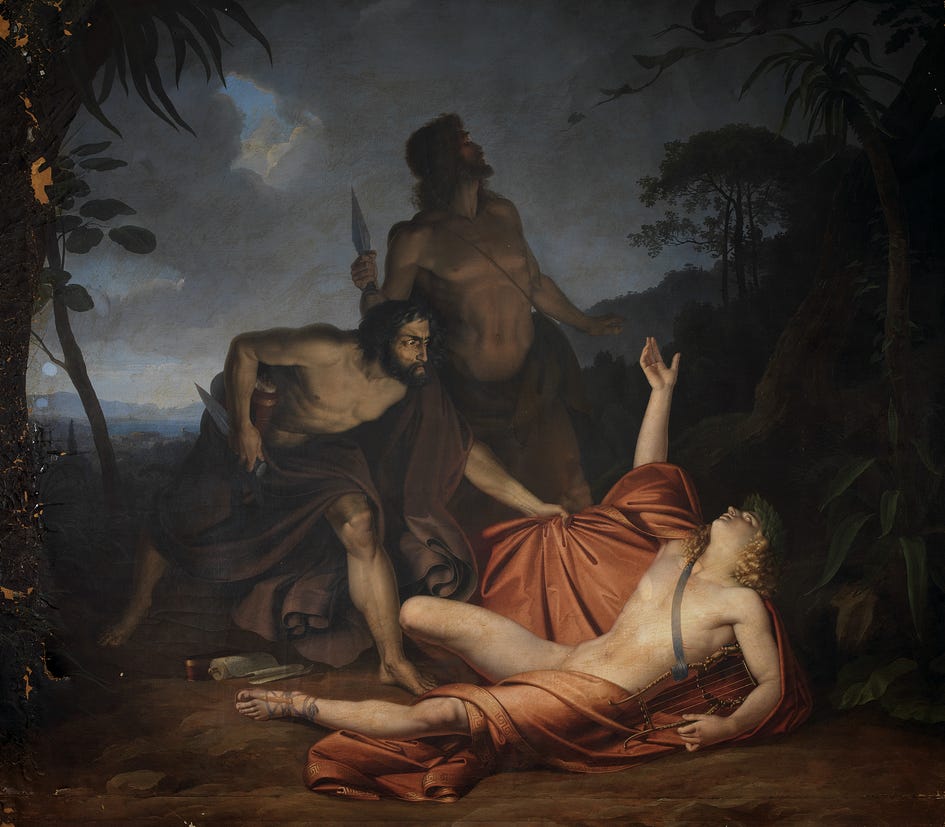
Does Schiller’s work suggest we in the West should act like helpless onlookers waiting for the Erinyes to appear while we watch a real-life tragedy unfold? Does it mean that we should wait for some higher power to exact vengeance on the criminals and oligarchical slave masters who played so great a role in rotting out Western society’s mind, body and soul—largely through untold mass psychological operations and silent economic wars?
Not at all.
However, it does mean we should remember that a higher system of law exists, one no amount of evil and injustice can erase—much to the chagrin of those ancient oligarchies and their social engineers.
So too in Shakespeare’s Hamlet, the bard reminds us: “Murder, though it have no tongue, will speak.” These works highlight the quintessential character of evil, which is that it thinks itself above and immune to any higher Natural Law. That is its essential character.
The unpredictability of a higher system of Natural Law whose mysteries a decrepit oligarchy or wayward criminal lacks the ability to fathom is what haunts such characters the most. It’s what classical dramatists have been able to artfully capture since the time of Classical Greece.
While we can’t expect the Erinyes to appear and strike down the criminals on the stage of our own modern historical drama, we should remember that much of what happens on the stage is a reflection of what happens off the stage. That is, what we are capable or incapable of playing out on the stage of our own imaginations in many ways determines what happens off the stage—in real life—in the form of the choices we make or don’t make, the things we say or don’t say—the insights which we either choose or fail to develop.
On Evil
Evil may be very well organized, but it’s also very unnatural. On the other hand, while the Good, the True and the Beautiful might rarely make a grand appearance on the stage of universal history, when firmly rooted in the breasts of even just a few individuals—Martin Luther King’s “creative minority”—its ripple effect has a characteristically nonlinear quality. It functions very much unlike the kinds of predictable linear models Western oligarchs and their social engineers believe all mankind and history should be governed by.
The poet Percy Bysshe Shelley recognized this creative nonlinear quality in the human species as expressed in the seemingly poetical ways in which Justice tends to manifest itself in history. So, Shelley in the conclusion of his “A Defence of Poetry” declared:
“The most unfailing herald, companion, and follower of the awakening of a great people to work a beneficial change in opinion or institution, is poetry. At such periods there is an accumulation of the power of communicating and receiving intense and impassioned conceptions respecting man and nature. The person in whom this power resides, may often, as far as regards many portions of their nature, have little apparent correspondence with that spirit of good of which they are the ministers. But even whilst they deny and abjure, they are yet compelled to serve, that power which is seated on the throne of their own soul.”
This poetry may appear in the form of a song, a psalm, a speech, or sermon—or even just the right word at the right place and time.
Whether in Schiller’s “The Cranes of Ibykus” or in Classical Greek tragedies like Aeschylus’ Prometheus Bound, each work in some way recognizes that Zeus—that is, the would-be heirs of the Gods of Olympus and violators of Natural Law—have an uncanny way of sowing the seeds of their own destruction—much in the same way that our modern Western oligarchy’s lack of insight has led it to increasingly destroy its own ability to control world events, creating the space for a new multi-polar order to emerge.
At this point, the author would like to cite an extended passage on the nature of the Classical Greek myth of Prometheus by the late philosopher and economist, Lyndon Larouche. In his “What Is God, that Man Is in His Image?,” Larouche writes the following on the subject of Aeschylus’ Prometheus Bound:
“To illustrate a crucial point, let us return our attention to tragedy, this time to the pregnant moment of Aeschylus' Prometheus. Perhaps no drama ever written addresses more directly the interconnected issues of truthfulness affecting both statecraft and theology.
“By legend, Prometheus was fettered to a rock, ostensibly punished by the Zeus-led Gods of Olympus for hubris against those heathen gods. In the course of Aeschylus' drama, an anomaly appears: it is Zeus himself who is foredoomed by a higher power, a doom which Zeus shall bring upon himself.
“Who is this Zeus? Who are these so-called gods of Olympus? All of the legends associated with them, in Aeschylus' writing and elsewhere, indicate a mortal origin, possibly a kingdom of sorts established by the "Peoples of the Sea" in the more fertile region of modern Morocco. By some apotheosis, they appear to have become the immortals, the gods of Olympus. In that ensconcement, they have become the mortal enemies of mankind, a mankind defended by the Titan Prometheus, a Prometheus who brings the art of fire and other technologies humanity requires to survive the oppression of the evil Zeus' Olympic oligarchy.”
Larouche adds the following qualifier for a complete interpretation of the myth:
“Superficially, it might appear, Prometheus is being punished for this offense against Zeus' will. As the drama unfolds, Prometheus is being tormented to supply to Zeus the secret of Zeus' own destruction, in Zeus' vain hope that by knowing this secret, he will be able to avert it. Here, then, lies the tragic fate of Zeus: he will be destroyed by the fruit of his own capricious lusting. At the conclusion of the first part of Aeschylus' Prometheus, Prometheus is relegated to immortal torment, to await the day he is rescued through the foreordained destruction of Zeus, through the ‘Twilight of the Gods of Olympus.’”
Lastly, Larouche describes one more dimension of the story:
“In real history (and pre-history), until the revolution in statecraft born out of the influence of the A.C.E. 1440 successes of the Council of Florence, over ninety-five percent of the people of all cultures, in all human existence, existed in an oppressed state of serfdom, slavery, or (as under the evil Aztecs) worse; there were no "good" ancient societies, no aboriginal or otherwise primitive cultures which were not evil on this account. The remainder of those cultures, less than five percent of the total population, was composed of chiefly two classes. At the top, a relative handful of powerful ruling families, akin to the Venetian nobility of relatively modern European times. Underneath the oligarchs, with the status of lackeys, were the military, the priests, the clerks, the merchants, and so on. It is the shadows of this ancient real-life drama which are encapsulated in Aeschylus' Prometheus.”
While much slavery throughout history has been at least ostensibly physical, the nature of modern empire in the post-war period has been axiomatically organized around a subtler kind of psycho-spiritual slavery, with the traditional “boots on the ground” form having long since been deemed less efficient and sustainable by the modern would-be Olympians and Atlanticists. This subtler form requires a special sort of half-witting consent, paired with a deeply pessimistic view of man. When combined, this lethal combination creates the perfect Huxlian slave—an individual bound by the narrow sphere of his or her own personal and immediate self-interest, with little or no imagination left for conceptualizing any higher sphere of thought or action.
But the purpose of a truly classical imagination is not entertainment. It offers us the ability to imagine a great tragedy performed on the stage of our own imagination—much like the function of a Greek or Shakespearean chorus—such that we might gain insight into the nature of our own choices or indecision, rather than playing out the tragedy in real life.
This is the true purpose of great tragic art and poetry.
As John F. Kennedy said in his speech at Amherst College, one month before he was assassinated:
“When power leads men towards arrogance, poetry reminds him of his limitations. When power narrows the areas of man’s concern, poetry reminds him of the richness and diversity of his existence. When power corrupts, poetry cleanses. For art establishes the basic human truth which must serve as the touchstone of our judgment.”
John F. Kennedy — Remarks upon receiving an honorary degree from Amherst College, Amherst, Mass., 26 Oct. 1963
Contrary to the voyeuristic pop-culture induced trends of living out our lives like some kind of bad Hollywood movie, the final chapters of this real-life drama remain unwritten, though we stand at a critical juncture not unlike the pregnant moment—Schiller's “punctum saliens”—found in the greatest classical drama.
The Tragic Death of Zeus
In conclusion, we could view the current events of our modern twenty-first century tragedy in subtly different ways, but these subtle distinctions could lead to markedly different outlooks—and actions. After all, many have treated the Promethean tale as the tragedy of the Titan Prometheus who was duly punished for his hubris against “the gods,” and needlessly self-sacrificed for an ungrateful and indifferent human race; others recognized that from the standpoint of true classical drama, Aeschylus’ Prometheus Bound could be appropriately subtitled “The Tragic Death of Zeus.”
As Larouche writes in the same “What Is God, That Man Is in His Image?”:
“Aeschylus' Prometheus drama, otherwise fairly subtitled "The Tragic Death of Zeus," lies in a line which links the best of the Ionian Greek culture, through Solon's reforms at Athens, to Plato's Academy. It represents that side of the division of ancient Classical Greek culture between the evil of the slave-society which was Lycurgus' Sparta, and the principle of human equity embodied in Solon's reforms. It represents the division between the aspiration for the form of society implicit in the Council of Florence and Louis XI's French commonwealth reform, and the depravity which is oligarchical society. It reaches out to a God who is above the evil oligarchs of Zeus' Olympus.
“In this way, Classical poetry, Classical drama, Classical music, and Classical painting such as that of Leonardo da Vinci and Raphael, are the great teachers of that law and morality upon which the proper organization of society depends. Classical art is premised upon the same agapic creative principle which the higher hypothesis embodies in natural science and technological progress. Art is the mother of science, the spirit without whose nourishment scientific endeavor would fall lifeless. Art is the means by which men and women gain insight into those principles by which a successfully developing society must be ordered.”
What might a victory against the historical forces of Western oligarchism look like today? What form would such a world take? What should we to make of someone who has lost the ability to even conceptualize such a future?
As we commemorate the anniversary of JFK’s assassination (November 22, 1963), let us dare to be wise—“aude sapere”—contemplating the pregnant moment of our contemporary historical drama. Let us cultivate an imagination bold enough to play out on the stage of our own imaginations not only some fanciful tale of make-believe, a romantic fairy tale, or dystopian fiction, but a truly Shakespearean or Classical Greek drama—ever remembering the struggle of Prometheus, and never forgetting the Erinyes.





